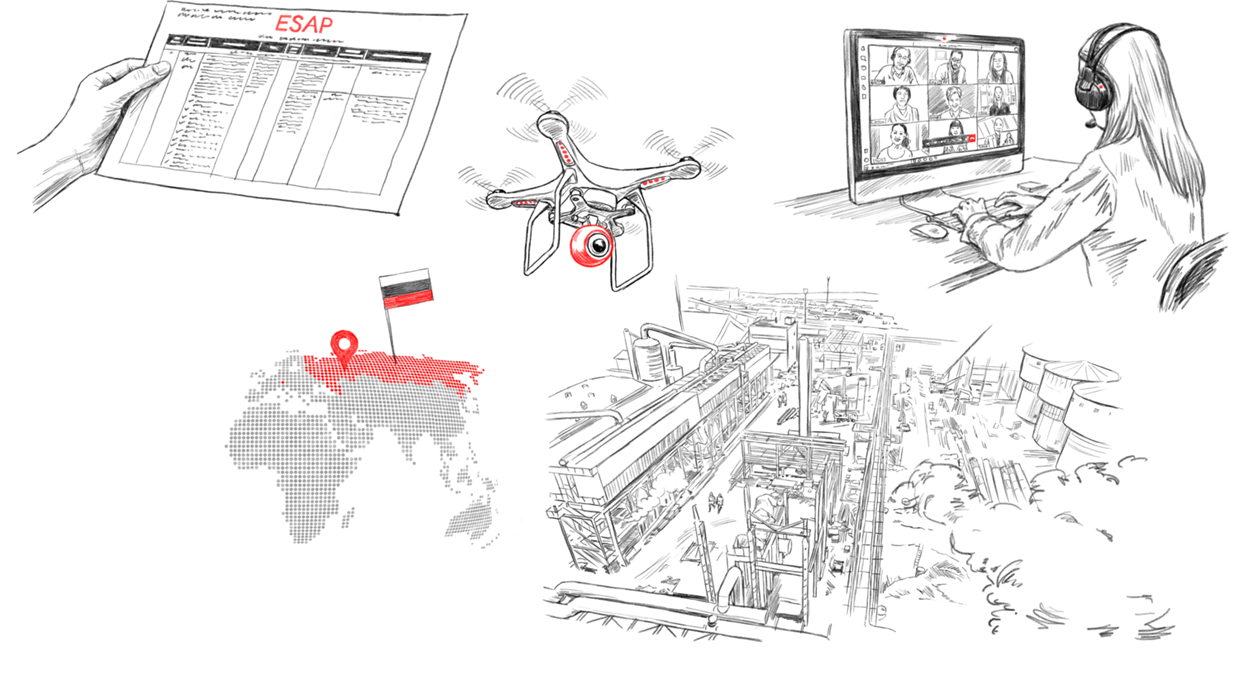Sustainability
sustainability
Auditing of insurance transactions to ensure their compliance with the environmental, social, human rights and anti-corruption requirements is a high priority for SERV.
When assessing insurance applications, SERV observes the international guidelines of the Organisation for Economic Co-operation and Development (OECD) and the principles of Swiss foreign policy according to Art. 6 para. 2 SERV Act (SERVG). These relate in particular to the peaceful co-existence of peoples, respect for human rights and promotion of democracy, conservation of natural resources, alleviation of poverty and destitution in the world, but also to preserving Switzerland’s independence and protecting its national welfare. Further requirements may arise as a result of Switzerland’s obligations under international law. Where necessary, on-site visits are also carried out to assess larger, environmentally relevant projects. Due to travel restrictions resulting from the COVID-19 pandemic, these site visits and meetings with project participants were conducted virtually.
Climate strategy
SERV has joined the federal administration’s environmental and resource management system (RUMBA) and, as a result, reports its own greenhouse gas emissions to the federal government. SERV implements the requirements of the federal government’s climate package and offsets all its greenhouse gas emissions. SERV is therefore a certified carbon-neutral company.
SERV developed a climate strategy during the 2020 financial year. The three cornerstones of the strategy include the handling of SERV’s own greenhouse gas emissions, integrating climate risks into business operations and SERV’s contribution to decarbonising the economy. SERV is not free to design its climate strategy, as it is obliged to adhere to the specifications of the federal government in addition to those set out in the SERV Act (SERVG) and the SERV Ordinance (SERV-V). Its statutory mission does not allow SERV to exclude certain sectors, such as fossil fuels, a priori. Instead, it is obliged to examine each insurance application on a case-by-case basis. SERV does, however, have the ability to take a cautious approach to projects that involve high greenhouse gas emissions and specifically promote climate-positive projects. The precise elaboration of these two points is an important first step in the implementation of SERV’s climate strategy. The Board of Directors will examine the climate strategy and the implementation measures in detail at the beginning of 2021.
Transparency
All projects with a contract value of CHF 10.0 million or more will be published on the SERV website, subject to the policyholder’s approval.
SERV also maintains a regular dialogue with interested non-governmental organisations (NGOs). Within the framework of this NGO dialogue, SERV provides information about its business results and specific current projects, as well as developments at SERV and in the OECD export credit group. In 2020, this dialogue was conducted digitally, with representatives from SERV and from the organisations WWF, Public Eye, Pro Natura and Transparency International taking part. This exchange of views is very much appreciated by all participants, and the NGOs expressed their satisfaction with SERV’s high level of transparency.
Anti-corruption
When presented with allegations that applicants or parties involved in an insured transaction are complicit in bribery, SERV must carry out extensive investigations (due diligence) based on its compliance policy and OECD regulations.
In 2020, SERV carried out enhanced due diligence on two applicants. In both cases, it was able to determine that the applicants currently had a robust anti-bribery system in place and that there were no irregularities in the transactions that SERV had been approached to cover.
Sustainability Audit

Monitoring for a new urea factory
The Swiss company Casale, based in Lugano, is acting as general contractor for the construction of a urea factory in Tolyatti, Russia. This will increase the production capacity from about 2 800 tonnes per day to 5 000 tonnes. Benefits of the new factory: the operator can integrate the new factory into its existing infrastructure and thereby minimise additional environmental pollution. Construction work began in October 2018 and is scheduled to be completed by March 2022.
Environmental and Social Action Plan (ESAP)
The transaction is classified as a Category B project under the OECD Common Approaches and is therefore subject to an in-depth assessment of compliance with sustainability requirements. This assessment took place at the beginning of 2018 and, as is customary, was carried out by an independent consulting firm. The assessment resulted in a plan of action. In this Environmental and Social Action Plan (ESAP), the consulting firm specifies the measures that must be undertaken to comply with the environmental, social and human rights requirements. The definitive criteria are the environmental and social standards of the International Finance Corporation and the World Bank.
The consulting firm prepared the ESAP in close collaboration with SERV, the financing bank, Casale and the local operator. In this project, the measures for the current construction phase primarily concerned occupational safety on the construction site and collaboration with sub-contractors, alongside measures to ensure that the local population is not affected by noise and odour emissions.
Monitoring under special conditions
Compliance with these measures is generally monitored and the project is currently in this phase. This was, however, made more difficult by the epidemiological situation in 2020: on-site visits were no longer possible due to travel restrictions and lockdown regulations.
Nonetheless, necessity is the mother of invention. The buyer provided the consulting team and SERV with drone images of the construction site and discussions took place virtually. “This meant that it was still possible to carry out the monitoring,” explains Judith Capello, Vice President, International Relations & Business Policy, adding: “We are pleased with how it went and see this type of collaboration as a valuable addition to site visits, both now and in the future.” The regular exchanges allow misunderstandings to be resolved, know-how to be transferred and corrective measures to be initiated promptly.